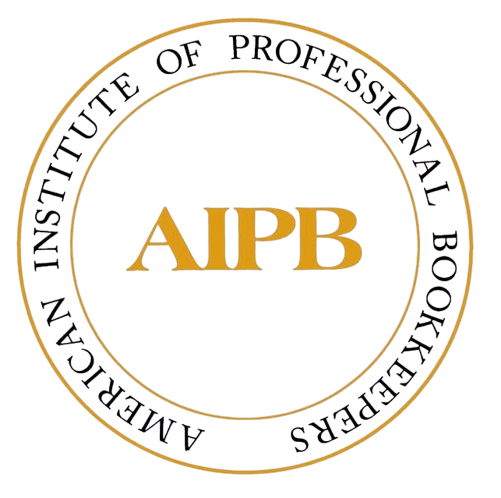Clients often look at certifications to verify a level of experience and expertise when selecting a bookkeeper, so we’ll walk you through how to become a certified bookkeeper. From assessing your current level of education to choosing a certification program, our guide will help you.
The two top professional bookkeeper organizations—the American Institute of Professional Bookkeepers (AIPB) and the National Association of Certified Public Bookkeepers (NACPB)—offer nationally recognized certification programs. You can also become certified through local or online college courses or specialize in particular accounting software. We have evaluated each of these programs to help you determine the best one for you.
Step 1: Assess Your Current Level of Education
It’s important to first assess your current level of education when deciding how to become a certified bookkeeper. Two goals of your education should be to:
- Learn the skills to become a competent bookkeeper; and
- Meet the education requirements of the certification program
Evaluate whether you currently have the knowledge to be an efficient bookkeeper or the formal education or equivalent experience that could be applied toward certification. If you’re looking for a program that teaches you bookkeeping in addition to providing certification, you may also want to cultivate other specialties, such as QuickBooks, which will help you to further your career.
Step 2: Address Your Need for Credibility
As a financial professional, your credibility is key and a major factor in attracting or retaining clients. The primary purpose of becoming a certified bookkeeper—rather than just learning bookkeeping—is to enhance your credibility.
So, you need to decide exactly what type of credibility you’re seeking. Do you want to be more credible across bookkeeping in general or just for a particular software program, like QuickBooks or Xero? This will assist in determining the best type of certification for you.
Step 3: Consider Your Available Time and Money
Time and money are valuable resources, and you want to spend both wisely. Think about how much time you have available every week and during the duration of the course. Additionally, take whether a self-paced or structured schedule is best for you into account.
Also worth considering is whether the exam itself is scheduled online or in person and how often it’s administered. The cost of the exam—including the enrollment fee, course materials including workbooks, and any administrative fees—should also be taken into account.
Step 4: Choose Your Bookkeeper Certification Program
There are several bookkeeper certification programs available. You can opt for a professional organization, such as AIPB or the NACPB, which offers rigorous training programs and the distinction of a certified bookkeeper (CB) or certified public bookkeeper (CPB) title upon successful completion of the program.
Alternatively, you can locate a suitable online or traditional college course that will provide you with certification along with a thorough bookkeeping education. If you’re an efficient bookkeeper, you may want to focus on one particular accounting software program.
Becoming a certified bookkeeper is recommended as the first step in our article on starting a bookkeeping business. The following are the most popular types of bookkeeper certification programs:
- AIPB: Best for individuals who don’t have a formal education in bookkeeping
- NACPB: Best for individuals with a bachelor’s or associate’s degree in accounting
- Intuit Academy Bookkeeping Professional Certificate: Best for individuals seeking a low-cost bookkeeping credential
- Online and traditional college courses: Best for individuals wanting to expand their bookkeeping knowledge and preferring to have access to an instructor while they learn
- Accounting software certification: Best for individuals specializing in a particular accounting software application and wanting to be certified as an expert
Annual Membership Cost | Course, Exam & Materials Cost | Certification Earned | Experience/Education Required | |
|---|---|---|---|---|
AIPB | $479 for members; $574 for nonmembers | Certified Bookkeeper | Experience required | |
NACPB | $200 for members; $250 for nonmembers | $1,675 for members; $2,095 for nonmembers | Certified Public Bookkeeper | Experience or education required |
Intuit Academy Bookkeeping Professional Certificate | N/A | $39 monthly through Coursera | Intuit Academy Bookkeeping Professional Certification | None |
Online and traditional college courses | N/A | Varies | Varies | None |
Accounting software certification | Varies | Advisor status for QuickBooks, Xero, and Zoho Books | None |

Pros
- Certification can help you gain new clients and justify raising bookkeeping rates
- Membership gives you access to AIPB’s Member Telephone AnswerLine, which will answer your bookkeeping and payroll questions
- CB designation can be added to marketing materials and websites
- Monthly newsletter provides information about the latest federal and state changes in bookkeeping, payroll, recordkeeping, and reporting
Cons
- Certification is limited to bookkeeping as compared to NAPCB, which offers multiple certifications like accounting and tax
- Annual requirement to complete Continuing Professional Education (CPE) credits
- First and second parts of the exam must be taken in person at a testing center
- One-year membership: $60
- Enrollment cost: $25 for members, $60 for nonmembers
- Workbooks: $254 for members, $314 for nonmembers
- National Certified Bookkeeper Exam: $200 for both members and nonmembers
In 1997, the AIPB established the first national standard for bookkeepers: the Certified Bookkeeper program. Available in every state, this certification displays a mastery of key bookkeeping concepts and skills, establishing national credibility. These credentials demonstrate proficiency and assure potential clients that you’re capable of completing required tasks.
Once you have successfully met all certification requirements, you’ll receive a certificate of completion, and you also can put the letters “CB,” which stands for certified bookkeeper, after your name. You can then use this in your email signature and on your business cards, social media profiles, and other marketing materials. This will let potential clients know that you’re qualified, which will generate new leads and allow you to negotiate higher billing rates.
AIPB certification consists of five steps:
- Submit an application
- Meet the work experience requirement
- Pass the four-part certification exam
- Adhere to the code of ethics
- Complete an average of 20 hours of CPE each year
Once you have submitted your application, you must ensure that you meet the work experience requirement, which is at least two years or 3,000 hours, before you are eligible to seek certification. You have three years to fulfill this requirement from the date that you pass the exam.
The certification exam consists of four parts. Parts 1 and 2 must be taken at a testing center and parts 3 and 4 are “take-home” exams that you can complete at your own pace and mail to the AIPB for grading. You must earn a grade of 75% for parts 1 and 2 and 70% for parts 3 and 4 to achieve certification.
The final step is key to maintaining your certification. As with most certification programs, CBs must acquire 60 continuing professional education credits over a three-year period from the anniversary of the last certification test passed―or from the date that you satisfy the experience requirement if this requirement is met after you pass the exam―and every three years thereafter.

Pros
- Multiple certifications available besides bookkeeping, including payroll, QuickBooks, accounting, tax, and accounting analysis
- Membership includes access to free bookkeeper certification practice tests
- Completing the Accounting Fundamentals course and passing the Bookkeeping Certification exam authorizes you to use the organization’s certificate and logo
- Exam is open book, and you have two hours to complete it
Cons
- Annual requirement to complete CPE credits
- Enrollment requires proof of either experience or education—the program is not offered to bookkeeping novices
- Self-paced program is not ideal for those who benefit from a more structured course
You have the option of obtaining a certification or license, and there is an associated fee for both. In addition to that, you will pay a fee for any exam that must be completed. Membership is not required to take a course, apply for a license, or become certified—but it provides significant discounts for these costs. A certification certifies you in a specific area and does not expire. A license has more requirements and thus costs more.
- One-year membership: $200 for members and $250 for pro members, paid on an annual basis
- One-time certification: $319 for members and $399 for nonmembers
- Certified Public Bookkeeper license: $1,276 for members and $1,596 for nonmembers
- Exam fee: $80 for members and $100 for nonmembers
The NACPB is ideal if you already have some kind of formal education, such as an associate’s or bachelor’s degree in accounting. It’s also best for someone who has a minimum of two years (4,000 hours) of experience working as a bookkeeper. Since it’s a nationally recognized organization, obtaining certification through it will afford you credibility among potential clients.
This self-paced program requires discipline to study and learn the course material on your own. If you thrive in this type of environment, then you’ll enjoy the flexibility of learning on your own time. The coursework includes exercises and quizzes to ensure that you have mastered the material. After you have completed everything, you’ll schedule the certification exam.
The organization offers both a bookkeeper license program and a bookkeeper certification. Similar to AIPB’s bookkeeper certification program, NACPB’s requirements to obtain licensure include having experience in accounting or bookkeeping, passing an exam, and maintaining the license by completing CPE credits.
Training is available through the NACPB, which includes free bookkeeper webinars, courses, and videos. You can also purchase bookkeeper guidebooks. Other free resources include bookkeeper news and updates, a dictionary of terms, and a bookkeeper support video knowledge base.
After successfully passing the exam and meeting all of the requirements, you’ll receive a certificate of completion. You’ll also be able to put the letters “CPB,” which stands for certified public bookkeeper, behind your name. You can include this in your email signatures and on business cards, social media sites, and all of your marketing materials to promote your achievement.
To obtain certification through the NACPB, you can choose one of two paths:
- license by education
- If you already have a bookkeeper’s certificate from an accredited school or an associate’s or bachelor’s degree in accounting, then you qualify to apply for your license through this path. This means that the knowledge and skills that you have already achieved are enough for you to apply for a license without any prior experience working as a bookkeeper.
- license by work experience
- If you have more work experience than you do education as a bookkeeper or accountant, then you should apply for your license through this path. This means that you must have at least two years (4,000 hours) of experience working as a bookkeeper or accountant.
Here are the steps you need to take to complete either path:
- Pass the exam
- Agree to abide by the Code of Professional Conduct
- Obtain 24 hours of CPE each year
- Submit the CPB application for licensure
You can take online and in-person courses to achieve the required CPE credits each year. You can also continue your professional education with NACPB CPE courses in bookkeeping, payroll, QuickBooks, accounting, accounting analysis, tax, and business communication. Two of these courses—Bookkeeping with QuickBooks Online and Payroll with QuickBooks Online Payroll—are free for NACPB members. The Accounting with QuickBooks Online Accountant course is free to pro members.

Pros
- Good starting point for those without bookkeeping experience
- More affordable than other bookkeeping certification programs
- Offered through Coursera, letting you learn at your own pace and schedule
- Specific training on using QuickBooks for bookkeeping tasks
Cons
- Certificate is not as widely recognized or held in the same esteem as AIPB or NACP certificates
- No continuing education opportunities
- Program is more theory-oriented and could benefit from additional practice exercises
This online program is offered through Coursera, which offers a seven-day free trial. After that, there is a $39 monthly fee that must be paid while you are taking courses and exams.
Because the course is self-paced, the certificate can be completed within a couple of months depending on how much time is available in your schedule. There is no cost for materials or the exam aside from the Coursera fee. Once you have received your certification, there are no further fees or memberships required.
Overall, the Intuit Academy Bookkeeping Professional Certificate is a good option if you are new to bookkeeping and want to learn the basics, especially if you plan to use QuickBooks. However, if you are aiming for a broader bookkeeping career or want a more recognized credential, this may not be the best option. While recognized by Intuit, this certification may not hold the same weight as more established industry certifications, like the CB or CPB.
The bookkeeping certification consists of four courses designed to build your bookkeeping knowledge progressively. Intuit estimates the courses should take a total of about 80 hours, or 2 months if you spend 10 hours per week. While the platform has some flexibility, it’s best to take the courses in this order:
- Bookkeeping Basics
- Assets in Accounting
- Liabilities and Equity in Accounting
- Financial Statement Analysis
Once the courses have been completed, you are eligible to take the certification exam. Upon passing the exam, you’ll receive the Intuit Academy Bookkeeping Professional Certification. Once you are certified, Intuit’s program doesn’t offer any additional benefits, and no membership is required.

Pros
- Structured courses are offered both in-person and remotely
- Large variety of options; you can find the course that best suits your schedule and budget
- Certification is from an accredited institution
Cons
- Not a nationally recognized certification, like AIPB or NACPB
- Some programs, such as UCLA Extension’s Bookkeeping Specialization, can be cost-prohibitive
- Don’t generally offer self-paced programs, which limits schedule flexibility
- Certification doesn’t come with a logo that you can use on your marketing materials
Pricing will vary greatly depending on the college selected, but here’s the pricing for UCLA Extension and U.S. Career Institute’s programs:
- UCLA Extension: $3,260 for the four-course program
- U.S. Career Institute: $589 if the tuition is paid in full upfront or $689 if you opt for automatic monthly payments
There are several additional bookkeeper courses and certification programs that will provide certification. One benefit to this type of study is that you’ll have access to instructors while you learn. Available courses are UCLA Extension’s Bookkeeping Specialization program and U.S. Career Institutes’ Bookkeeping Specialist program.
Unlike the AIPB and NACPB certifications, you won’t earn the certified bookkeeper or certified public bookkeeper distinction when you complete these courses. However, you’ll receive a certificate from an accredited institution that shows you have the knowledge and skills to perform the duties required of a bookkeeper.
While you won’t receive the type of certification that allows you to put a “CB” or “CPB” behind your name, completing a bookkeeping course at an accredited institution will equip you with the knowledge necessary to service your clients and give you access to a pool of resources that will ultimately help you to further your career.
Online and traditional college courses differ in terms of their requirements for education and experience. It’s important to examine the details for each to determine if the program fits your individual needs.
UCLA Extension
The four-course Bookkeeping Specialization program is offered by UCLA Extension. It’s designed for experienced bookkeepers, office managers, or those looking to make the transition to a career in bookkeeping or accounting. While this course is offered by UCLA, which is located in Westwood, California, classes are offered both online and in-person.
As long as you maintain a GPA of 2.5 or higher in each course, you’ll receive a certificate upon completion of all courses in the program.
Below is a list of the courses that are included in the Bookkeeping Specialization Program:
- Bookkeeping and Accounting Essentials I
- Bookkeeping and Accounting Essentials II
- Accounting Using QuickBooks
- Payroll Tax and Accounting
U.S. Career Institute
The U.S. Career Institute is an online educational institute that provides affordable, real-world training designed specifically for the distance learner. It offers a Bookkeeping Specialist certificate that includes:
- Accounts Receivable
- Accounts Payable
- Computerized Bookkeeping
- Financial Statements
- Closing the Books
The program can be completed at your own pace, and you can email or call your instructor with any questions.
Below, we’ve included a few details on the certification programs available for three of the top small business accounting software.
1. QuickBooks ProAdvisor
QuickBooks is the most popular accounting software used by small businesses. There are many benefits that come with this program, such as a ProAdvisor certification badge that you can include on marketing materials, like your business cards and website. In addition, you’ll be listed on Intuit’s Find-a-ProAdvisor website so that small businesses needing to hire a QuickBooks Pro can find you. If you’re interested in learning more, read our article on how to become a QuickBooks ProAdvisor.
2. Xero Advisor
Xero is a great alternative to QuickBooks. To achieve certification, you must complete a four-hour certification course. As a certified Xero Advisor, you’ll have an account manager assigned to you to answer questions, get access to free software, and be listed in the Xero Advisor Directory so that potential clients can find you.
3. Zoho Books Advisor
Zoho Books is part of the suite of business apps offered by Zoho. To become a certified Zoho Pro, you just have to complete a one-hour webinar. As a Zoho Books Advisor, you’ll receive free software, tech support when you need it, and a listing in the Zoho Advisor directory so that small businesses needing assistance can find you. You can also network, with exclusive access to Zoho’s partner portal and events that are conducted worldwide.
Pros
- No cost to become certified as a QuickBooks ProAdvisor, Xero Advisor, or Zoho Books Advisor
- Certification gives you access to free software for QuickBooks, Xero, and Zoho Books and a free listing in advisor directories
- QuickBooks ProAdvisors can include a certification badge on all marketing materials
- Ideal for virtual learners
- No formal education or bookkeeping background required to become certified
Cons
- Only software-specific training and certification available
- Xero and Zoho Books Advisor programs aren’t as thorough or comprehensive as certified bookkeeper programs
- While QuickBooks has a formal ProAdvisor program with lessons and an exam, there are no equivalent programs for Xero and Zoho Books
There is no cost to become certified as an advisor in these accounting software programs. The following is required for each:
- QuickBooks ProAdvisor: Sign up for QuickBooks Online Accountant for free, and you’ll be eligible to take part in the QuickBooks ProAdvisor Program automatically.
- Xero Advisor: Join Xero’s Partner Program, and you’’ receive Xero and Xero HQ for free as well as access to online training courses to earn Xero certifications.
- Zoho Books Advisor: Register for the Zoho Consulting Partner Program, and you’ll receive free access to Zoho products.
If you already have the bookkeeping knowledge you need, you might choose to grow your business around a particular accounting application by becoming certified in that software. This enables you to gain a better understanding of the software so that you can support your small business clients. You’ll also have added credibility and increased visibility from being listed in advisor directories so that potential clients can find you easily.
Becoming certified in accounting software—such as QuickBooks, Xero, or Zoho Books—is a wise decision, especially when the majority of your clients use that particular software. Although you won’t earn a more general bookkeeping certification, you’ll receive access to free resources, such as software, tech support, and a free listing in member directories. QuickBooks ProAdvisors will also be able to use a certification badge on all marketing materials.
- QuickBooks ProAdvisor: You don’t need an accounting or bookkeeping background or any type of formal education to become a QuickBooks ProAdvisor. Plan to invest at least 12 to 16 hours of study time to prepare for the exam, which consists of 80 questions. You must receive a passing score of 80 percent or better, and you can take it up to three times if you don’t pass on your initial attempt. For more information, read our guide on how to become a QuickBooks ProAdvisor.
- Xero Advisor: Xero Advisor certification shows you how to use all of the core features of the software, from setup to bank reconciliation and reporting. To complete the course and become certified, you must attend both the live consecutive sessions and complete the two assessments. The course is worth 4 CPE credits.
- Zoho Books Advisor: You simply need to register for the Zoho Consulting Partner Program and attend the free one-hour webinar. Zoho will also provide training materials to help you master the software. You’ll receive free access to Zoho Books’s premium plan and a dedicated account manager who’ll serve as a single point of contact.
Frequently Asked Questions (FAQs)
No, but a certification can significantly enhance your resume and make you a more attractive candidate to potential employers.
The timeframe can vary depending on your prior knowledge, chosen study path, and exam format. In general, it can take a few months to a year.
The benefits include increased earning potential, improved job prospects, greater credibility and recognition in the industry, and a stronger foundation in bookkeeping principles and practices.
Yes, both the AIPB and NACB require certificate holders to complete ongoing CE credits to maintain their certification status. The specific number of credits and completion timeframe may vary.
Bottom Line
The right certification for you will depend on your level of education and experience, your need for credibility, time and financial resources, and the type of accounting software you wish to specialize in. Two popular options are certifications and/or licenses available through the AIPB and the NACPB. Other options include online and traditional college courses and accounting software certification programs.


